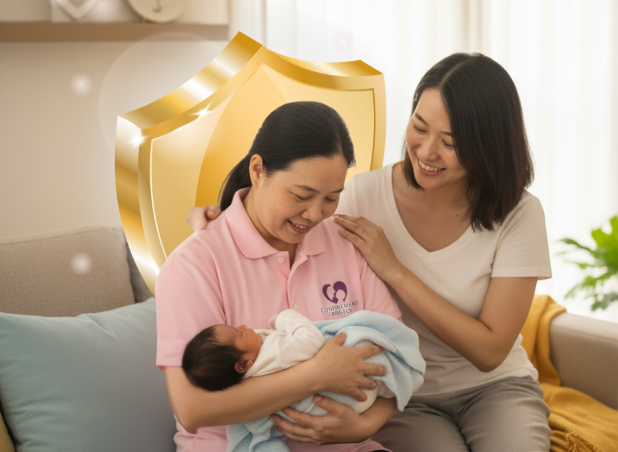Bringing a baby into the world is often seen as one of the happiest times in a woman’s life. However, many new mothers feel emotions that don’t match this ideal. It’s important to remember that experiencing a wide range of emotions during this time is completely normal and not a sign of failure. The baby blues are common, with brief periods of mood swings, tears, and tiredness that usually fade within two weeks. When these feelings grow stronger and last longer, they may signal something more serious: postpartum depression.
This guide explains what postpartum depression is and how it differs from baby blues. It highlights early signs and symptoms expectant mothers should recognize, along with risk factors that increase vulnerability.
By understanding the difference between baby blues and postpartum depression, expectant mothers can navigate the postpartum period with more awareness, confidence, and support. Practical self-care strategies are included to help mothers prepare in advance, along with advice on when to seek professional help.
What is Baby Blues (Postpartum Blues)

The baby blues, sometimes called “maternity blues,” are common and a normal part of the postpartum period. They are short-term mood changes that appear within a few days of childbirth.
Causes
These shifts mainly happen because of the sudden drop in hormones after delivery, the stress of childbirth, and adjusting to new parenthood.
Symptoms
- Sudden mood swings, from joy to sadness
- Tearfulness or crying without a clear reason
- Feeling overwhelmed or anxious
- Irritability or being easily upset
- Constant tiredness from the demands of caring for a newborn
- Changes in appetite, either eating less or more than usual
- Difficulty falling asleep or staying asleep, even when the baby is resting
These symptoms are usually mild and temporary. They tend to come and go during the day and don’t severely disrupt a mother’s ability to care for her baby or herself.
What is Postpartum Depression (PPD)

Postpartum depression is a more serious and longer-lasting mental health condition that goes beyond the temporary blues. Unlike baby blues, it disrupts a mother’s ability to care for herself and her baby.
Causes
While hormonal changes may play a role, PPD is often influenced by several factors, including a history of depression or anxiety, stressful life events, complications during pregnancy or birth, and limited social or family support.
Symptoms
Postpartum depression symptoms are stronger and last longer than baby blues. They may include:
- Persistent sadness or emptiness lasting most of the day
- Loss of interest or pleasure in activities that once felt enjoyable
- Significant changes in appetite, leading to weight loss or gain
- Sleep problems, such as insomnia or sleeping too much
- Constant fatigue or lack of energy, even after rest
- Difficulty concentrating, making decisions, or remembering things
- Irritability, agitation, or frequent mood swings
- Intense feelings of guilt, shame, or worthlessness
- Avoiding family, friends, or social contact
- Difficulty bonding with the baby
- Thoughts of harming oneself or the baby (urgent sign to seek professional help)
Baby Blues vs Postpartum Depression: The Key Differences
The biggest differences between baby blues and postpartum depression lie in intensity and duration:
- Baby Blues: Mild, temporary, and usually gone within 1–2 weeks. Symptoms are uncomfortable but manageable, and mothers can still function day-to-day.
- Postpartum Depression: More intense, longer-lasting, and disruptive to daily life. Mothers may feel unable to care for themselves or their baby without help.
How Postpartum Depression Affects Both Mother and Baby
Postpartum depression affects more than just the mother. It can impact the baby and the whole family. Babies often sense their mother’s distress, which may show up as fussiness, feeding issues, or poor sleep. If left untreated, bonding and attachment may also be affected, which can influence the child’s growth.
Family members feel the strain too. Partners may struggle with stress or helplessness, while older children may sense tension at home. This ripple effect can disrupt harmony in the household. That’s why support is so important. Partners can play a crucial role by listening attentively, sharing daily tasks, and encouraging professional help when needed. Simple acts, like taking turns in baby care, managing household chores, and offering emotional support, can make a significant difference. With help from loved ones, healthcare professionals, and even confinement nannies, mothers can recover better, babies feel secure, and families adjust with more ease.
Practical Self-Care Tips for New Mothers
Small but consistent habits can make a big difference in mental health after childbirth:
- Resting whenever possible, even in short naps
- Eating nourishing meals that restore energy
- Taking light walks or gentle stretches when the body is ready
- Practicing relaxation techniques such as breathing exercises
- Accepting help from loved ones without guilt
It’s important to speak with a healthcare professional if:
- Feelings of sadness or mood swings last beyond two weeks
- Emotional struggles worsen instead of improving
- A mother feels unable to cope with daily responsibilities
- Thoughts of self-harm or harming the baby occur (this requires immediate medical attention)
How a Confinement Nanny Can Help
During confinement, having the right support can make all the difference. A professional confinement nanny not only helps with newborn care but also allows mothers to rest, eat well, and feel reassured that they are not alone. For mothers who can’t access a nanny, reaching out to friends, family, or local community groups can offer valuable support. These alternative supports can help alleviate stress by sharing responsibilities and providing emotional encouragement, ensuring that mothers still receive the necessary assistance during this important time.
By caring for the baby, preparing nutritious meals, and handling household tasks, a nanny allows mothers to rest and recover. This support reduces stress, prevents burnout, and helps mothers focus on bonding with their newborn.
Why Choose Confinement Angels
Confinement Angels, the first confinement nanny agency which has an in-house training centre with professionally-trained nannies in Singapore. So if you are looking for confinement nanny Singapore, you need not look further. Did you know – Confinement Angels has received the Singapore’s Best Confinement Nanny in 2024! Besides that, our confinement nanny Singapore agency provides a holistic service with different experiences to mummy and daddy so that you can get prepared for your parenthood!
Postpartum recovery has never been this easy and stress-free with Confinement Angels Nanny Agency Singapore. So, get your FREE confinement consultation now!









